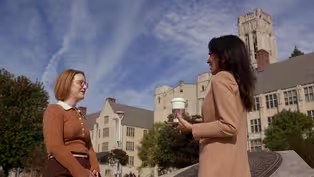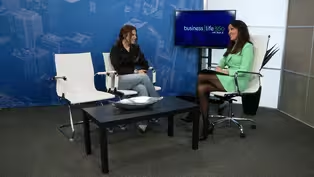Business | Life 360 with Kristi K.
Emma Lembke
Clip: 10/19/2023 | 8m 29sVideo has Closed Captions
Emma Lembke joins Kristi K. virtually on Business | Life 360.
Emma Lembke joins Kristi K. virtually on Business | Life 360. She is a 20-year-old youth digital advocate at Washington University in St. Louis working to address social media's impact on younger generations. As a senior in high school, Lembke founded the Log-Off Movement, a youth movement dedicated to uplifting and empowering youth to tackle the complexities of social media and it's impact.
Problems playing video? | Closed Captioning Feedback
Problems playing video? | Closed Captioning Feedback
Business | Life 360 with Kristi K. is a local public television program presented by WGTE
Business Life 360 with Kristi K. is made possible in part by KeyBank National Association Trustee for the Walter Terhune Memorial Fund and ProMedica Toledo Hospital, celebrating 150 years of serving our community.
Business | Life 360 with Kristi K.
Emma Lembke
Clip: 10/19/2023 | 8m 29sVideo has Closed Captions
Emma Lembke joins Kristi K. virtually on Business | Life 360. She is a 20-year-old youth digital advocate at Washington University in St. Louis working to address social media's impact on younger generations. As a senior in high school, Lembke founded the Log-Off Movement, a youth movement dedicated to uplifting and empowering youth to tackle the complexities of social media and it's impact.
Problems playing video? | Closed Captioning Feedback
How to Watch Business | Life 360 with Kristi K.
Business | Life 360 with Kristi K. is available to stream on pbs.org and the free PBS App, available on iPhone, Apple TV, Android TV, Android smartphones, Amazon Fire TV, Amazon Fire Tablet, Roku, Samsung Smart TV, and Vizio.
Providing Support for PBS.org
Learn Moreabout PBS online sponsorshipWelcome back to Business Live 360 m a lemke is joining us today.
She is a 20 year old youth digital advocate at Washington University in Saint Louis working to address social media impact on younger generations.
As a senior in high school, Lemke founded the Log Off Movement, a youth movement dedicated to uplifting and empowering youth to tackle the complexities of social media and its impact on their privacy, safety and mental health.
As a youth led movement, log Off provides an often overlooked and critical perspective on social media, and we're going to learn a lot more about that from Emma Lemke.
Ella, it's so great to have you here on Business Life, 360.
Thanks for joining us.
Emma Lembke: Thank you so much for having me on.
Kristi K: So tell us a little bit more about what got you started in terms of advocacy for social media.
Emma Lembke: So my entry point into advocacy related to social media and digital wellbeing, privacy and security all stems back to my own personal experience.
I got social media in the sixth grade, starting with Instagram and making my way through the ranks of platforms from Twitter to Snapchat and to eventually Tik Tok.
And when I first entered these apps, I was one of the last in my friend groups to actually be on.
And I remember seeing each one of my friends around me slowly retract from the moment, looked down at their phones and no longer connect with me in person.
So seeing that around me, I instantly thought, okay, there has to be something incredibly magnetic and magical about these apps that are pulling my friends and my time and attention away from me and towards their phones.
So I begged and begged and eventually got the the parents to cave.
And I was given permission to get Instagram.
And when I first got on, I felt that magic.
I felt that allure.
I was following people from Kim Kardashian to Olive Garden to all of my friends from middle school.
And it felt like the world was at my fingertips.
But that feeling was transient.
It lasted maybe a month.
And what I was left with after having followed so many individual was curating my feed posting consistently was just a mirage.
I was left with the reality that social media isn't magic.
It truly is an illusion, one that is carefully predicated on capturing your attention at the cost of a young person's well-being and privacy and security.
So for me, as a young female, I was quantifying my worth through likes and comments and followers.
I was being fed harmful content related to body image and eating patterns that led me in the direction towards disordered eating.
I was consistently passively scrolling, scrolling mindlessly for hours and feeling incredibly guilty, not knowing how to detach and not knowing what was happening to me.
And all of these things were really worsening my mental health and my quality of life.
And eventually, after multiple years of doing this, scrolling, mindlessly feeling passive in my own life and passive and all my experience, I had a breaking point where I heard the buzz of notification and had the following response to grab for my phone.
And between that buzz and the response, I finally broke and I asked, What is happening?
How am I, as a young person, values so much control, Allowing these platforms and these apps to really control me?
And how is this being done and how can I protect myself?
So I detached and of course logged off for a few months and really reflected on my own screentime usage.
How did I benefit from the online world?
Where did I really feel like I was harmed?
And I did the research.
I looked at everything from are algorithms, you know, how are they at play?
How do they work?
Is social media bad?
And in all of the research, what I kept finding was more and more material both individuals investigating social media's impact on young people, both the positive benefits and the negative externalities.
But there was always a missing piece.
The young people themselves.
Kristi K: I love that.
That you're really getting them involved.
So knowing that you're not alone and the fact that you're stepping out, being a voice for generation Z is really, really important.
So how do you see some of those talking points when you're presenting, in fact, to the Senate Judiciary Committee and some of those things?
What are some of the talking points and some of the goals that you have to really make an impact?
Emma Lembke: One, it's that to fix this issue, to better understand how to protect kids online, we need to understand the issue all of its complexities, all of the ways it benefits young people, all the ways young people are harmed.
And what that means is providing a seat at the table for young people to not just participate as passive onlookers, but active agents of change.
And the second thing is young people really need to become empathic.
They need to be empowered because I think we provide a very nuanced take with social media.
Because if you ask any member of Gen Z, you know, the genie is out of the bottle, we are not going to go back to a world where social media didn't exist, nor should we.
But we need to really think critically at the individual and the societal level about how we want to spend our time with each other and where social media comes into the picture to amplify our connected, expressive and exploratory benefits, but also how we can really work together then to mitigate its harms and to roll back a lot of the unforeseen and detrimental aspects of living in an unregulated digital environment.
Do you have such a thing as a recommendation for what is healthy in terms of the amount of time that, let's say, teenagers or 20 somethings or any of us for that matter, spend on social media, on our phones, perhaps gaming?
Emma Lembke: I always say that what is healthy for one person can look very differently for another, and specifically when it comes to screen time.
For instance, for me, I had to unplug for about two months and be off my platforms Instagram, Snapchat to then feel like I could reenter in a healthy way for others.
I know some people who have to fully unplug who don't want to reenter.
I think at the basis of building and determining what your healthy screen time usage looks like is reflection and awareness with all things to be able to address an issue, you need to be aware of the issue.
In the beginning.
Kristi K: When you're in business life.
360 We do something that is called Quick Hits, which is a series of rapid fire questions where we ask you a little bit more detail about some things that we are interested in about you.
Are you ready?
Emma Lembke: Absolutely.
Kristi K: Okay, here we go.
What is your favorite social media platform?
Instagram your have of choice Embroidering.
The last person you followed on social media.
Emma Lembke: Jonathan Heit.
Kristi K: Your first pet.
Emma Lembke: My pets.
Sparky.
My cat.
Kristi K: The kind of music you like most.
Emma Lembke: I adore folk and bluegrass music.
I'm from Alabama, so it's in my in my veins.
Kristi K: Your leadership characteristic that you choose to emulate most empathetic listening.
The city where you were born.
Emma Lembke: Birmingham, Alabama.
Kristi K: The most important issue facing kids health today.
Emma Lembke: Social media's impact on youth mental health and well-being.
Kristi K: And one mark that you would love to leave on your generation.
Emma Lembke: The understanding that social media does not have to define you.
You can define it and use it to chart a better path for you, your family, and beyond.
Kristi K: And the Lemke co founder of the Love Life movement.
Thank you so much for being the voice that we all need in this world to allow our youth and all of us to no longer be an afterthought.
Thanks, Ava.
Emma Lembke: Thank you for having me on.
Video has Closed Captions
Clip: 10/19/2023 | 6m 57s | Kristi heads visits the University of Toledo to discuss the business of social (6m 57s)
Video has Closed Captions
Clip: 10/19/2023 | 7m 52s | Kristi is joined by Caly Bevier, a contestant on America's Got Talent. (7m 52s)
Providing Support for PBS.org
Learn Moreabout PBS online sponsorship
- News and Public Affairs

Top journalists deliver compelling original analysis of the hour's headlines.

- News and Public Affairs

FRONTLINE is investigative journalism that questions, explains and changes our world.












Support for PBS provided by:
Business | Life 360 with Kristi K. is a local public television program presented by WGTE
Business Life 360 with Kristi K. is made possible in part by KeyBank National Association Trustee for the Walter Terhune Memorial Fund and ProMedica Toledo Hospital, celebrating 150 years of serving our community.

